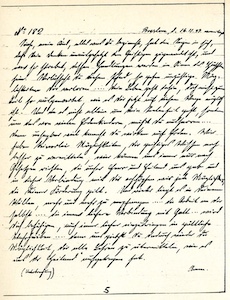The ability to believe presupposes wanting to believe.... You will be unable to convince those people who can't muster the will to attain the truth, for their unwillingness leaves them open to the influences of God's opponent, to whom they increasingly more fall prey and who will only ever influence them to close themselves to every spiritual influx on the part of God. Spiritual knowledge cannot be proven; it has to be believed.... However, people are not expected to believe blindly, the truth is made accessible to the human being but it is left up to him what he makes of it, for God grants every human being freedom of will. The human being is therefore more or less facing a crucial decision as soon as he is offered spiritual information.... he can accept or reject it.... But in order to make this decision his will has to become active. If the human being rejects it without further investigation then he cannot say: I cannot believe it, instead he must say: I don't want to believe it.... If, however, he is willing to understand it then he will examine it.... and only then will he be entitled to reject it if he cannot agree with it, or he will gain an inner conviction and thus 'believe' even though the evidence cannot be given to him. Someone who means well will certainly be correctly guided in his thinking.... even if he had not so far wanted to acknowledge anything that can be described as spiritual knowledge. Blind faith is worthless, only a convinced faith will give rise to blessings. But a convinced faith can only be gained if the human being wants to attain realisation, if he desires clarification about things that are hidden to him, about secrets which human intellect cannot unveil.
Every individual person and can will presume that he only possesses partial knowledge, that therefore many unsolved problems still exist for him. If these problems concern earthly questions, they can be solved intellectually. The results can be tested and also be changed.... Then the evidence can be produced that the human being's thinking was right.... But apart from the earthly world there also exists a spiritual world.... Although this, too, must only be 'believed' again, yet revelations from this spiritual world are sent to people which could almost be classed as evidence already.... but always leaving it open to certain doubts, which need to be overcome by a person himself, and this requires his will. He is able to provide the evidence for himself and thus gain convinced faith but he must also want to do it.... Someone who does not contribute towards it cannot acquire anything for himself, and 'faith' cannot be granted to a person as a gift, otherwise a free decision of will could not be spoken of. First the human being must want to believe and through living a life of love enable himself to learn to distinguish, for he should never believe in errors, and he is entitled to reject what he is unable to believe if he seriously means it and does not reject all spiritual information given to him. The ability to believe presupposes wanting to believe. Blind faith, however, is nothing a person can be proud of.... Blind faith is not pleasing to God, after all, it testifies to indifference towards the truth and the right realisation. The human being should use his intelligence but not only his intelligence, he should also question his heart, which means as much as that he should also pay attention to his feelings, for the One Whom people have problems having faith in manifests Himself through the heart.... but Who also rewards the will if it is good and is aimed in the right direction....
Amen
This proclamation is used in the following themebook:
| Themebook | Title | Download |
|---|---|---|
| 29 | Belief - Disbelief - Superstition |
|











